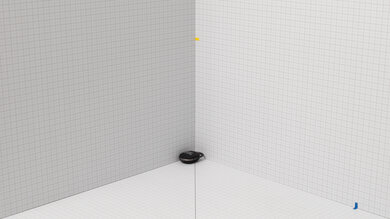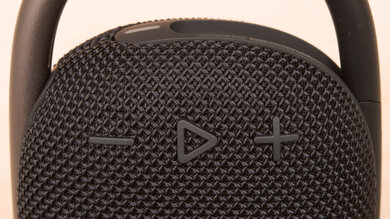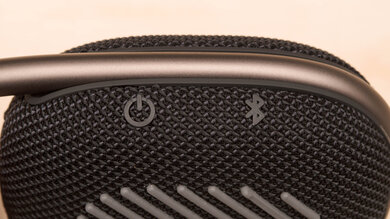The JBL Clip 4 is the fourth generation of the JBL Clip. As its name suggests, it has a built-in carabiner hook to "clip" it onto your bag or backpack while on the go. It has a slightly different design than previous speakers in the Clip lineup, with a more square-like shape. Overall, it's lightweight and portable, with an IP67 rating for dust and water resistance to protect it against the elements while listening to your favorite music outdoors.
Our Verdict
The JBL Clip 4 is middling for music. It has a slightly bass-heavy sound out of the box, adding punch to the mix. However, voices and lead instruments are slightly muddied, and the speaker can't bring the deep thump and rumble in the low-bass. There aren't any sound customization tools, either.
- Clear reproduction of voices.
- Doesn't get very loud.
- No sound customization features.
The JBL Clip 4 isn't meant for watching videos and movies, but if you pair it to your phone to watch some videos, it can get the job done. Its low latency with iOS and Android devices means you don't notice any lip-synching issues, and audio is in sync with the video on your screen. Dialogue is reproduced with clarity, too. However, it doesn't get very loud, and there isn't a lot of rumble in the bass for action-packed scenes.
- Low latency over Bluetooth.
- Doesn't get very loud.
- Lacks low bass.
The JBL Clip 4 is decent for podcasts. With a clear reproduction of voices in the mix, dialogue is easy to follow, so you don't miss a beat in your favorite shows. Its portable design makes it easy to bring from room to room. That said, it doesn't get very loud, so if you plan to listen in a larger or more open space, you'll want to ensure you're close to the speaker to follow along with your podcasts.
- Portable design.
- Clear reproduction of voices.
- Doesn't get very loud.
- No sound customization features.
This speaker doesn't support voice assistants.
The JBL Clip 4 is acceptable for outdoor use. Overall, this small, lightweight Bluetooth speaker is easy to bring with you, whether on a hike or chilling at the park. It's sturdy and durable, too, with an IP67 rating for dust and water resistance to protect it against the elements. Since it doesn't get very loud, you'll want to keep it close by when listening to your favorite tunes.
- IP67 rating for dust and water resistance.
- Portable design.
- Doesn't get very loud.
- Lacks low bass.
Changelog
- Updated Sep 24, 2024: The Compared To Other Speakers section and
- Updated Aug 15, 2024: We've added a comparison between this speaker and the JBL Clip 5 in Bluetoooth.
- Updated Jan 11, 2024: Updated review text for clarity and consistency. No changes in test results.
- Updated Sep 12, 2023: Added market comparison for the Bushnell Wingman Mini in the App box.
Check Price
Differences Between Sizes And Variants
The JBL Clip 4 comes in several color variants: 'Black', 'Blue', 'Gray', 'Green', 'Orange', 'Pink', 'Red', 'Squad', which has a camo motif, 'Teal', 'White', 'Yellow', and 'Blue-Pink'. We tested the black model, and you can see its label here. We expect all color variants to perform similarly to our model.
Also, you can find the Clip 4 Eco series in 'Blue', 'Green', and 'White'. These versions are made of recycled materials.
If you come across another variant, please let us know in the forums, and we'll update our review.
Popular Speaker Comparisons
The JBL Clip 4 is the fourth generation of the JBL Clip. Like other speakers from the Clip lineup, it has a locking mechanism on its top side so you can hook it to objects like bags while you're on the go or outdoors. However, this generation is more square-shaped and has a larger logo on its front. It's a wallet-friendly speaker that lacks more premium features like sound customization, which you find with the Anker Soundcore 3 or JBL Go 4, and its battery life isn't as long-lasting as similarly-priced models like the Sony SRS-XB100.
See also our recommendations for the best portable Bluetooth speakers, the best Bluetooth speakers under $100, and the best golf cart speakers.
The JBL Clip 5 is the next generation of the JBL Clip 4 and comes with a host of improvements while maintaining the formula that has made the Clip series popular. Both speakers are well-built, extremely portable, and IP67-rated. With the new generation, the distinctive carabiner hook has been redesigned to be wider and easier to clip onto things. JBL have also added Bluetooth multi-device pairing, as well as companion app compatibility, so you can tweak the sound via a graphic EQ and presets. The newer version also has a more balanced sound and can get louder, though it compresses more at max volume. For these reasons, it's well worth picking up the Clip 5 over the Clip 4, regardless of your preferred usage.
Both the JBL Go 4 and JBL Clip 4 can be a better choice for you, but it depends on your needs. The Go 4 is a bit smaller and lighter, and it floats if you drop it. Out of the two, it's the only one with a companion app that lets you EQ it, and it includes a bit more battery life. However, the Clip 4's integrated carabiner clip might be more helpful than the small fabric loop on the Go 4. The Clip 4 also has better directivity, providing a more consistent sound at various listening angles, alongside better bass extension. It has lower latency, which makes a difference when watching videos. Although, it compresses your audio more than the Go 4.
The JBL Clip 4 is a slightly better speaker than the JBL Go 3. While both speakers have a great build quality and are very portable, the Clip 4 can reproduce slightly more bass and has a wider soundstage. It also has lower audio latency on iOS and Android, although some apps compensate for this differently. However, the Go 3 can reach max volume with fewer compression artifacts.
The Sony SRS-XB100 is a better speaker for most uses than the JBL Clip 4. While both speakers are very portable and similarly well-built, the Sony has a more balanced sound with less compression present at max volume. It also has a significantly longer battery life and is compatible with a companion app. The JBL has lower AV synchronization error though, so it's a better choice for watching movies or video content in general.
Test Results

The JBL Clip 4 has a square-ish design that can easily fit in your hand. It comes in several colors, so you can find a style that best suits your preferences, and it has a carabiner hook built-in so that you can securely hang it from your bag. It also has a large JBL logo on its front side, which some users may find a little in-your-face. For another small, portable speaker that you can hook to your bag, check out the Bang & Olufsen Beosound Explore, which has a built-in carrying strap and a removable carabiner hook.
This battery-powered speaker is small and lightweight, so it's incredibly portable. It's designed to be taken along with you when you're out and comes with a built-in carabiner hook, which you can use to clip the speaker to your bag.
It has an impressive build quality. Aside from its rubber base, most of the speaker is wrapped in tight netting, and the built-in carabiner hook is thick and sturdy. It also has an IP67 rating for dust and water resistance that certifies it to be fully dust-tight and immersible in up to a meter of water for 30 minutes. Check out the iFox iF012 shower speaker for a small, well-built speaker with a removable carabiner clip and suction cup.
The controls are simple and easy to use. It has dedicated buttons to turn it on/off, play/pause audio, pair it via Bluetooth, and adjust the volume. You can also press the play button twice to skip to the next track, but there isn't a way to go to a previous track. The buttons are easy to press, and a chime plays each time you increase the volume. There's also a chime that plays while you're pairing a device. A white light appears to let you know when the speaker is on, and it flashes to let you know when you're pairing with a device. A red light on top of the speaker helps you keep track of the battery life. Since this speaker doesn't have a microphone built-in, you can't use its buttons to answer and end phone calls.
This speaker has a slightly bass-heavy sound. Extra punch in the bass range carries over into the mids, slightly muddying voices and lead instruments. Since it's a smaller speaker, it's no surprise that it also struggles to bring the deep thump and rumble in the low-bass. This is most noticeable with bass-heavy genres like EDM and hip-hop.
Most music is mixed in stereo, but unfortunately, this speaker has to downmix it into mono to play it back. That said, it has excellent directivity and a more 360-degree design that brings consistent audio from all angles.
This speaker gets loud enough to fill an average-sized living room with sound. However, it's pretty small, so it's not meant for listening in larger, more open spaces. There's some compression as you push it to max volume, too. The equally portable JBL Go 4 is a bit louder at max and doesn't compress quite as much.
The manufacturer advertises a battery life of ten hours, but in our tests, this speaker lasted 5.5 hours. It's worth noting that the settings you use can impact a speaker's battery performance. This model also has an auto-off feature that shuts it down after twenty minutes without an audio signal, which helps conserve power.
Check out the Bushnell Wingman Mini if you want a speaker with a golf-centric companion app.
Aside from its USB-C charging port, this speaker has no wired inputs.
This speaker has great Bluetooth connectivity. Its range is impressive, so the speaker can pick up a signal even if your device is further away. Also, thanks to its low latency, you don't have any issues with lip-synching when you watch videos and movies. Some apps compensate for latency differently, so your real-world experience may vary slightly. Sadly there's no Bluetooth multi-device pairing though, so you'll need to pick up the JBL Clip 5 for this.






